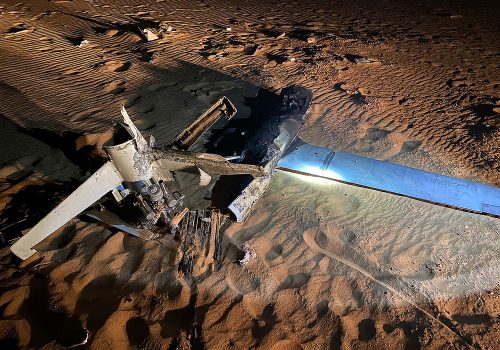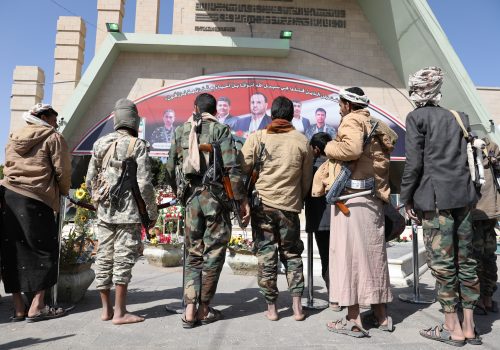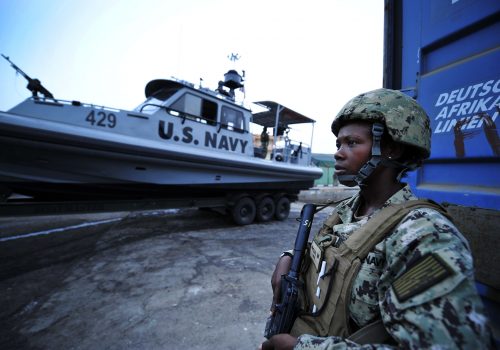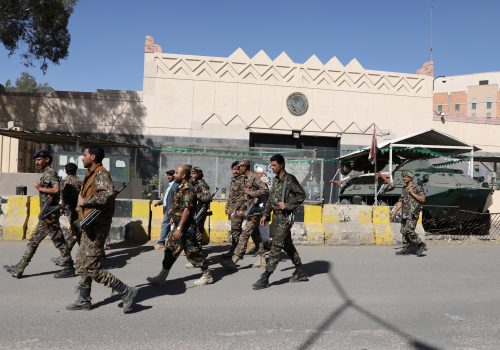Experts react: Iran-backed Houthis launched a drone attack in Abu Dhabi. What challenges lie ahead for the region?
On January 24, the United Arab Emirates (UAE) intercepted two ballistic missiles targeting its capital, Abu Dhabi. It was the second assault that Iran-backed Houthi rebels claimed responsibility for during the past week. Just a week prior, on January 18, Houthi rebels launched drone strikes near an Abu Dhabi airport that killed three people.
Responding to the first attack, the Saudi-led coalition, which the UAE backs, launched airstrikes on Yemen’s port city of Hodeida on January 21, hitting the country’s telecommunications center, which knocked out the internet and killed three children. More than eighty were killed at a detention center in a separate airstrike in the rebel-held Sa’ada province.
The UAE’s defense ministry said that the country “is ready to deal with any threats and that it takes all necessary measures to protect the state from all attacks.”
Below, Atlantic Council experts react to the news of the attack and assess the impact on the region.
Jump to a reaction:
William F. Wechsler: These recent attacks demonstrate Iran’s unique policy to routinely give precision weapons to proxies
Tom Warrick: Strategic relations matter
Barbara Slavin: This reckless Houthi attacks only deepen the need to find a solution
Randy Bell: The attack did little to the price of oil
Andrew L. Peek: These attacks are a silver lining for the UAE
Matthew Zais: Tehran must be held accountable for all its regional actions
Sina Azodi: Iran doesn’t have much control over Yemen’s Houthis
Masoud Mostajabi: The US and Western allies should take decisive action
These recent attacks demonstrate Iran’s unique policy to routinely give precision weapons to proxies
The recent attacks by the Houthis on Abu Dhabi clearly demonstrate, yet again, Iran’s unique policy to routinely give precision weapons to non-state proxies so they can intentionally target civilians across borders. It’s worth reminding all objective observers in Washington: no other government in the world does this. There are no daily reports of non-state Arab, Baluch, or Kurdish groups armed by the US or another power that continuously threaten to lob missiles and send drones across international borders to kill innocents inside Iran. And yet such practices are precisely Iran’s longstanding approach to projecting power against Israel—a policy it is now replicating against Saudi Arabia and the UAE.
William Wechsler, Director of the Rafik Hariri Center and Middle East Programs
Strategic relations matter
At a time when the United States and Europe would prefer to focus the world’s attention on Russia’s aggressive moves against Ukraine, the early morning missile attack against Abu Dhabi by Iran-backed Houthis nevertheless deserves attention in Washington and European capitals. Fortunately, the missiles were shot down by advanced military technology the UAE purchased as a result of their close military alliance with the US and West. Strategic relationships matter. Unfortunately, the Houthis’ strategic alliance is with Iran, which provides the Houthis with technology they need to launch missiles and unmanned aerial vehicles against civilian targets in the UAE and Saudi Arabia. The strategic relationship between the US and the UAE has stood firm for decades. The relationship between the Houthis and Iran, however, is a source of vulnerability, subject to disruption by interdiction of maritime and air supply lines. Washington and the West should consider increasing efforts to cut these lines, which can be done without jeopardizing Yemen’s already precarious humanitarian situation.
Tom Warrick, Senior Advisor, Scowcroft Middle East Security Initiative
This reckless Houthi attacks only deepen the need to find a solution
The reckless Houthi drone and missile attacks on the UAE only deepen the need to find a solution to the war in Yemen and de-escalate regional tensions more broadly. Whatever gains Emirati proxies may have made in Yemen in recent months have been undermined by the continuing killing of civilians in the Saudi-led air war, which uses US planes and bombs. The UAE has been compared to a “little Sparta,” but has bitten off more than it can digest by becoming so deeply involved in regional conflicts. Its main selling point is international trade stability, investment, and tourism. The Houthis’ attacks, using Iranian drones and rockets, are putting that in jeopardy.
Barbara Slavin, Future of Iran Initiative Director
The attack did little to the price of oil
The missile attack on the UAE did little to the price of oil. While Brent crude jumped by about $1 in early morning trading, this spike was short-lived. At the time of publication, the market was down by about 2 percent, largely driven by concerns over potentially-accelerated interest rate hikes in the United States and a stronger dollar. It seems the risk premium from UAE-Houthi tensions was largely baked in after the Houthi’s first attack on January 17. However, with a market this tight, any escalation in the region—or, in Ukraine, for that matter—could quickly shift traders’ focus away from fundamentals and back to geopolitics. In either of these scenarios, $100 oil is not out of the question.
Randy Bell, Senior Director, Global Energy Center
These attacks are a silver lining for the UAE
There is a large silver lining for the UAE in these attacks. The escalation comes after rare coalition victories on the battlefield by the UAE-backed Giants brigade. The military gains are a bonus, but these missiles are strong PR for the Emirati government in comparison to fighting it out with the Houthis in civilian areas through conventional ground combat. Dropping Iranian-supplied missiles on Abu Dhabi is the least sympathetic, defensible move the Houthis can make. It paints them in a far more feckless and irresponsible light than any other policy option they have and shifts the focus to their sponsor, Iran. That is a major and unfavorable strategic change.
By comparison, the only real strategic damage the missiles could do would be to hit Dubai, which is mainly a commercial port and tourist destination rather than an oil port. Its revenue depends on its image, and a sustained missile campaign could cause deep damage to the economy by denting its image as a safe liberal playground. That would also cause an internal political conflict for Abu Dhabi, but it has yet to happen. It may be that elevated military capabilities of a proxy Yemeni unit will deem the UAE to be the first Arab state to begin mastering proxy war, which at this point has been a uniquely Iranian skill in the Middle East.
Andrew L. Peek, nonresident senior fellow, Middle East Programs
Tehran must be held accountable for all its regional actions
The US can no longer distinguish between Houthi attacks against its allies as anything other than a direct extension of the Iranian regime. The UAE is now a cornerstone of the new economic and military cooperation in the Middle East, including its leadership under the Abraham Accords. Everything this new alignment represents directly threatens the Islamic Republic’s revisionist goals for the region. The Iranian-Houthi attacks also demonstrate the insufficiency of any nuclear agreement that doesn’t address the broader range of Iran-backed terrorism that expanded under the previous agreement and which now extends south through Yemen and east through Baghdad, Damascus, and Beirut. The US and its partners will only be able to effectively address the Houthi’s terrorist attacks when it holds Tehran accountable for all of its regional terrorism.
Matthew Zais, nonresident senior fellow, Middle East Programs
Iran doesn’t have much control over Yemen’s Houthis
The attacks come at a precarious time when Iran is trying to mend its relations with Saudi Arabia and the UAE, two important countries in the Persian Gulf region. There are two explanations for this: first, contrary to what has been said before, Iran doesn’t have much control over Houthi actions and, second, by attacking UAE facilities, the Houthis are undermining Iran’s efforts to mend relations with the UAE for their own interest. Alternatively, elements within the Iranian government believe that Iran can maintain the upper hand in the talks by continuing the pressure on the UAE and threatening future missile attacks.
Sina Azodi, nonresident senior fellow, Middle East Programs
The US and Western allies should take decisive action
In February 2021, President Joe Biden declared that the war in Yemen “has to end.” He added that the US would terminate its support for offensive operations in the war, including “relevant arms sales.” One year later, US arms sales have continued rapidly as the Saudi-led coalition has recently embarked on a series of offensives that have seen territorial gains in Al-Bayda and Shabwah provinces. With the UAE having reentered the Yemen war in 2021 after a period of downsizing its role, the recent Houthi strikes on Abu Dhabi are an indication of retaliation for the continued bombing of Yemen.
The West’s cynical continuation of providing arms sales in the hopes of building momentum to win an unwinnable war has only prolonged one of the largest humanitarian crises in the world. As the Saudis focus on wresting control of Yemen’s eastern governorate and the UAE focuses on Yemen’s south and strategic islands, the Biden administration and Western allies should take decisive action (as they did in Afghanistan) so as not to be party to a quagmire and a country’s dismemberment.
Masoud Mostajabi, Associate Director, Middle East Programs
Image: Residents and civil defence officials stand near cars and buildings damaged by shrapnel from the intercepted ballistic missile that landed in an industrial area, in south of Dhahran, Saudi Arabia, January 24, 2022. Saudi Press Agency/Handout via REUTERS



